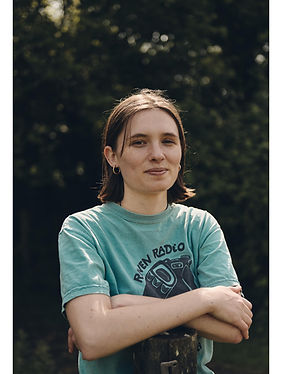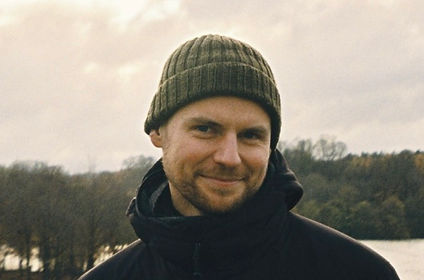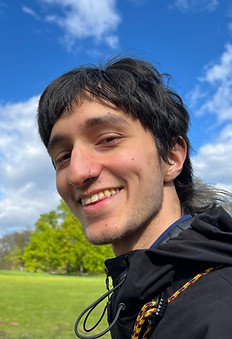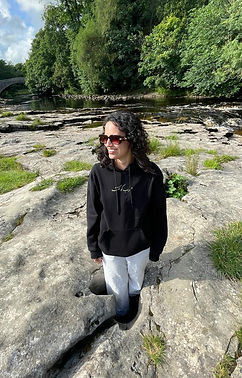
Our Team
Youngwilders started in 2020 as a passion project focused on young people and nature recovery.
Since 2022, we have functioned as a fully-fledged non-profit.

Youngwilders Core Team
Elen Griffith - Rewilding Project Officer
Having previously run wetland workshops for Youngwilders, Elen joined the team as a Rewilding Project Officer in 2025, becoming the first team member based in the North of England. She completed her MSc in Conservation Biology at Manchester Metropolitan University, following an undergraduate degree in Biology from the University of Manchester.
During her master's research, Elen studied the effects of peatland restoration on aquatic invertebrate populations in ponds in the Peak District, fieldwork she loved and which sparked her ongoing passion for wetlands.
Her role is centred on helping to deliver projects and youth engagement in the North, including the sites at Castle Howard and Hepple Estate and she is especially excited to see the Castle Howard site grow and develop as a hub for Northern rewilding.


Koto Shimada Atkins - Visual Lead
Koto is a photographer and visual artist who loves to use design to make an impact in the community. With a background in fashion, music, and lifestyle photography, she is drawn to DIY culture and creative storytelling as a way to connect people to ideas and movements. She believes in the power of visual media to engage, educate, and inspire action. As Visual Lead, she helps shape how the work is seen, using photography, design, and creativity to make rewilding more accessible and inspiring to a wider audience.
Molly Easton - Co-Director

Molly has worked in environmental policy and politics across the public, private and not-for-profit sectors for the last five years. Most recently, she was a Senior Adviser at Natural England, working on the Local Nature Recovery Strategy for Surrey, and Heathland Connections: a landscape-scale nature recovery project in West Surrey. From developing the communication and political strategy for environmental campaigns to launching a contest for young people to respond creatively to climate change in the run up to COP25, Molly is passionate about engaging and empowering audiences, particularly young people, to act on nature recovery. She holds an MSc in Environmental Technology from Imperial.

_edited.jpg)
Jack Durant - Co-Director
Jack studied philosophy at undergraduate level before completing a Masters at the Institute for Resources, Environment and Sustinability at the University of British Columbia in Vancouver. After a stint working as chemical pollution researcher and doing Youngwilders as a passion project on the side, he turned to focus on Yw full-time towards the end of 2021 and has since served as a Co-Director.

Noah Bennett - Co-Director
Noah has a background in Environmental Engineering, with a particular focus on hydro-morphology, flooding, and river restoration, and graduated with an MEng in The Environment, Energy and Sustainability in 2019. Following his degree, Noah worked for several years as an engineering consultant on a wide number of environmental projects with both the private and public sector.
Noah is now the technical lead at Youngwilders, responsible for the detailed design of our wilding projects as well as the behind the scenes mapping and calculations which support our work. Noah has a passion for improving watercourses as part of our projects, and believes that river restoration can be the cornerstone for connectivity between wild spaces.

-min.jpg)

Layla Mapemba - Engagement Lead
Layla’s interest in birdwatching led her to explore the outdoors with newfound curiosity and fascination. Introduced to the environmental sector through the London Wildlife Trust confirmed what she already knew - she loves working with young people and is keen for all people to experience the wonders of the natural world. With an undergrad in Psychology and a passion for social justice, creating accessible and inclusive ways to experience nature runs throughout all of Layla’s work with Youngwilders.

Meg Cookson - Lead Ecologist
Meg is a seasoned field ecologist with a strong foundation in ecological restoration. Her journey led her to Youngwilders after providing guidance and developing nature recovery strategies for numerous estates across the UK. Meg's focal points encompass nature recovery metrics and biodiversity monitoring, including baseline surveys and ongoing management to showcase the positive impacts of nature recovery. Her unwavering passion for these aspects is rooted in her time as an ecological consultant, where she witnessed firsthand the loss of biodiversity in large-scale development projects throughout the UK.
In her role as Lead Ecologist at Youngwilders, Meg actively engages in mentoring young individuals and newcomers to the field, imparting insights into surveying techniques and management practices. Her commitment to educating the next generation in nature recovery is a driving force in her work at Youngwilders.

Youngwilders Strategic Advisors
Anya Doherty - Strategic Advisor

Anya first saw the word 'wilding' hidden away in a lecture slide while studying for her degree in Natural Sciences. It wasn't the most hands-on introduction, but she soon found herself making regular visits to some of the UK's seminal wilding sites, determined to learn more about how wilding could work on the ground. Anya later taught final-year undergraduates in Conservation Science. Since then she has been working as the Founder and CEO of Foodsteps, a startup focused on helping food businesses track and reduce their greenhouse gas footprint. She counts the Peak District as a major natural inspiration after spending time in the hills near her grandparent's house.

Oscar Hartman-Davies - Lead Researcher
Oscar is an environmental social scientist with expertise in conservation policy and digital transformations in environmental governance. He believes strongly in the vital role of people in co-producing a wilder landscape together with nature and, being half Finnish, champions 'jokamiehenoikeus' (everyone’s right/the freedom to roam) as a guiding principle for wilding. He advises Youngwilders in a part-time, voluntary capacity.

Youngwilders Hall of Fame

Dee Sharma - Artist in Residence '24
Dee is an amateur ecologist and writer interested in analysis of bioacoustics and sound led ecological epistemologies. Their work with bioacoustics aims to study social behaviors across taxa. At Youngwilders they are studying insect sound and communication at Maple Farm and putting together an immersive soundscape for presentation at Youngwilders' events and beyond
Raphael Haque - Designer in Residence '24
Raphael is a designer based in London. He studied architecture at undergraduate level and will return to university to complete his masters in 2025. After working in the sustainability and heritage sectors of architecture, designing with hemp, straw, and timber, he worked on a community rewilding / architecture project in rural Japan building with local materials and craftspeople, where he will return this winter. With these skills and passion for the outdoors, Raphael will be responsible for the design and construction of the Youngwilders’ Overgrowth summit September 2024.

.jpeg)
Lillie Aissa-Jeanrenaud - Summer Intern 2024
Lillie is an ecological storyteller, writer and filmmaker reuniting nature and culture. Having worked with WWF-UK, Natural History Museum and Global Generation, she’s passionate about regenerative lifeways. At the centre of her work are inner city, diaspora communities and ecologies. At Youngwilders her responsibilities are primarily social media, writing and community engagement.
Seniz Mustafa - Summer Intern 2023
Seniz is an ecology and conservation master’s student who interns with the Youngwilders. She focuses her studies on the behavioural ecology of birds and their impacts on their surrounding ecosystems. Previously studying the foraging behaviours of common terns at Chichester Harbour, she now studies the dietary preferences and feeding behaviours of the white storks at Knepp Estate. She has a history of working in natural history education, working for the Field Studies Council, and is a regular volunteer at the Booth Museum of Natural History. She is passionate about creating online science communication and encouraging environmentalism to be more accessible and inclusive.

Iona McMillan - Summer Intern 2022

Studying a Geography BA to focus on her passion for connected justice for people and nature, Iona became fascinated by wilding and the promise it could hold for the future of our wildlife. Her dissertation explored the more-than-human relationships created through birdfeeding, and this belief in the importance of direct interaction and nature connectedness influences her perspective on rewilding. Iona is also a passionate advocate of the need for young voices in conservation, having been part of Keeping It Wild, Nottinghamshire Wildlife Trusts Youth Team, since 2017. She is currently interning with Youngwilders before starting a Biodiversity, Conservation and Management Msc.

Join us!

